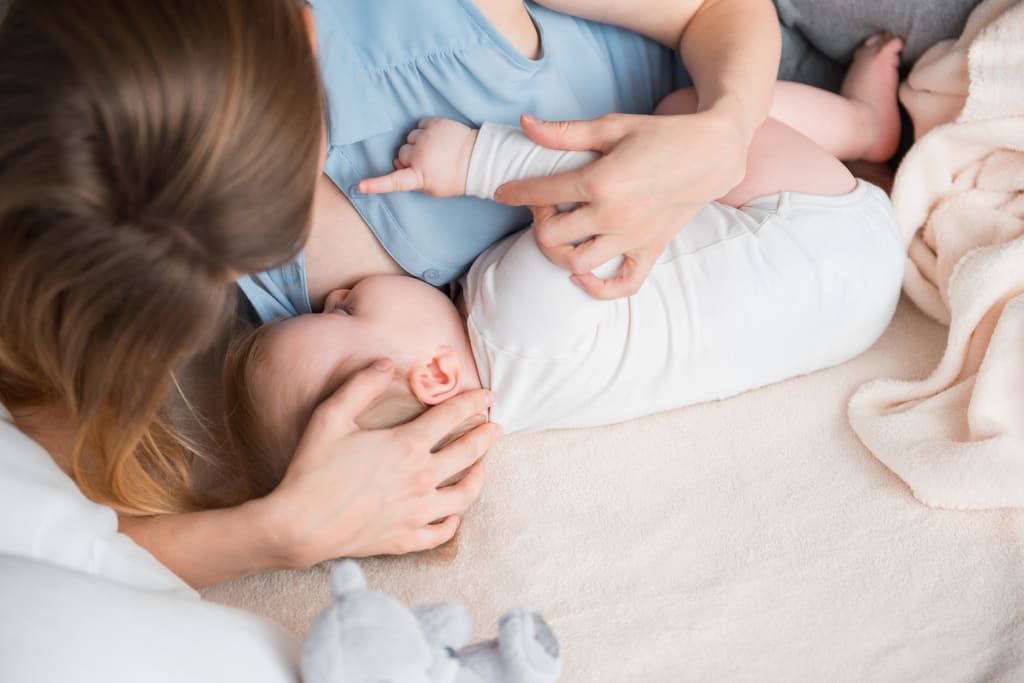Things Breastsleeping Does to Your Body
For future and new moms out there, you'll be surprised to find out the things breastsleeping does to your body.

Before diving into this article, let's discuss what breastsleeping is—and no, that's not a typo; you read that correctly.
Breastsleeping is simply the act of sleeping with your baby while breastfeeding. The term breastsleeping was created by James McKenna, Ph.D, the director of the University of Notre Dame's Mother-Baby Behavioral Sleep Laboratory.
However, breastsleeping isn't just some silly or ineffective trend. Some think it's here to stay. While both breastfeeding and bed-sharing are controversial, let's talk about why breastsleeping may actually be healthy for you and your baby.
It helps keep your milk supply healthier.
Interestingly, breastsleeping mothers have a healthier and more established milk supply than their non-breastsleeping counterparts.
As many know, tips for breastfeeding mothers include continuing to breastfeed stimulates further production of breast milk. This is why female cows living on ranches or farms have a consistent supply of milk, because people continue to milk them.
The thing with breastsleeping is that it allows a baby to be fed whenever they need it. Increasing the frequency of breastfeeding, as one may be able to piece together, can make a mother's milk supply stronger and more consistent and even of greater value.
Breastsleeping strengthens your bond with your baby.

Probably one of the more commonly-known facts regarding things that breastsleeping does to your body is that it can build a stronger mother-baby bond. A baby who develops a better sense of who their mother while young is believed to have better attachment and confidence.
For infants who suffer with a detached bond—especially newly-adopted babies or foster care children—breastsleeping can help build that once-broken bond.
Even bed sharing and breastfeeding as separate acts can each offer a better bond between a baby and a mother, so imagine what breastsleeping could help accomplish. That's part of the guide to a healthy breastfeeding relationship.
You'll wake up feeling better rested.
Mothers, let alone breastfeeding mothers, need plenty of sleep in part because every living thing needs adequate rest to healthily function but also because emotionally, physically, cognitively, and mentally, mothers need to be there for their babies.
Breastsleeping mothers, because they don't have to physically get up and walk to their sleeping baby in a crib, they can get better rest at night as their hungry infant is already in arm's reach.
Yet, both non co-sleeping, breastfeeding mothers and parents who choose bottle feeding, often have to wake up every few hours or so to feed their baby, causing havoc on not just sleep but restful, REM sleep. That's a tip for breastfeeding mothers from a breastfeeding mom.
You'll better understand your infant's physiological needs.
One of the next things breastsleeping does to your body is change how you mind processes caring for your baby's physiological needs. Especially for first time parents, knowing how often to feed their baby and how much is just one of the many tasks that come with new parenting.
However, it becomes more apparent for breastsleeping mothers the amount and timing between breastfeeding that is necessary as each baby is unique and has varying needs.
Instinctively, breastsleeping mothers will also gain perspective into the physiological needs of their infant as they gain "behavioral sensitivities" towards them, according to the University of Notre Dame.
Your baby may have improved social and emotional skills when they are older, potentially making it easier for you to parent in the future.

Probably the best benefits of breastsleeping aren't the ones that just help in the moment but the ones that can last a lifetime. Because a mother-baby bond is especially vulnerable in an infant's early months and years, the results that come about later can be substantial.
One of those life-long results of breastsleeping mothers is having a child that has better security, self-esteem, social skills, and emotional stability.
However, for adults who never had an adequate bond with their mother while young can have increased risks of anxiety, depression, and other emotional or mental disorders. They may also display dependent, unstable, immature qualities that can take years just to improve from.
It can potentially reduce the chances of Sudden Infant Death Syndrome (SIDS), bringing you peace of mind.
One of the scariest things about parenting is learning about the sad reality of Sudden Infant Death Syndrome, or SIDS. Any parent would be concerned that something like this could ever happen to their baby.
SIDS affects over a thousand babies annually for unknown reasons. Worst of all, it typically occurs during sleeping hours.
But mothers and babies who partake in breastsleeping are less affected by this syndrome and there are frequent breastfeeding sessions and arousal throughout the night.
The University of Notre Dame even stated, "Breastsleeping also potentially adds protection by helping infants to avoid the often dangerous, deeper sleep associated with formula feeding and solitary infant sleep."
It was also mentioned by the University of Notre Dame that solitary infant sleeping and/or formula-feeding are considered hazardous factors in deeper sleep, potentially increasing the chances of SIDS occurring.
Breastsleeping will improve your baby's sleep.
With breastsleeping, infants have a safer, more comfortable domain knowing that they are closer and warmer next to their mother as the night progresses.
Breastsleeping babies can achieve a better attachment to their mother both during and after getting a good night's rest next to their mother. When a baby has a stronger attachment, it is much easier to fall asleep and stay asleep for longer periods of time.
This is one reason why parents bedshare with their infant. However, throwing breastfeeding into the mix, the breastmilk alone can give an infant better sleep as it goes to bed with a full stomach.
It will provide less frustration for both you and your partner.
Last on our list of things breastsleeping does to your body is more of a mental/emotional one, but nevertheless, is quite important in parenting: less frustration for Mother and Father (if in the picture).
The parent(s) can have not just better sleep, but better quality sleep as there will be less frequent interruptions in the night knowing that their child is right next to the mother, already ready to be breastfed whenever necessary.
While breastsleeping babies aren't immune to crying, it helps tends to a baby's needs quicker and more quietly. The mother won't have to get up, shake the bed, turn on lights, and make sounds as she walks to her baby's crib, which in itself can be frustrating for everyone in the house.
Of course, we can't neglect the frustration and anxiety that may come about for one or both parents when frequent nightly interruptions occur due to a crying, hungry baby.
Something as simple as the above scenario can cause the parents moodiness and even resentment if one parent feels the other isn't playing a large enough role in parenting.
Breastsleeping can give new mothers peace of mind.

When you're a parent for the first time, it's not uncommon to feel a little lost, confused, and anxious. But it's okay to because you're still figuring things out.
When it comes to breastsleeping, first-time mothers will feel more secure and content knowing that their infant is by their side, just as their infant feels next to them sleeping through the night.
Mothers will be happier knowing that they can provide what their child needs, when they need it, especially when the mother is worried that they won't be able to wake up and be readily available at all times for their new baby. Breastsleeping allows a mother to do just that and quite effortlessly.
If an emergency occurs in the night, the mother is right there.
Sleeping in the same bed with your infant can have significant advantages when it comes to any type of emergency your infant may encounter.
Seizures, injuries in the night, ear infections, or illnesses can all be spotted and tended to if necessary when a mother is sleeping close to their child via the act of breastsleeping.
We've all heard of horror stories of mothers or fathers finding their newborn lifeless in the crib the next morning because of an incident that may have been able to be stopped if one of the parents was there.
While there is never a guarantee that your infant will be completely safe, breastsleeping does provide an extra safety net just to be on the safe side.
This isn't to say that mothers should be waking up every ten minutes to check their baby's vital signs or have severe anxiety that something could go wrong with their infant in the night. Rather, breastsleeping is a great option if your infant has already had its far share of health scares.
Overall, this article isn't designed to shame regular breastfeeding moms, non-breastfeeders, or parents who have their baby sleep in a crib or bassinet. It's not even meant suggest to you that breastsleeping is the best or only way of sleeping/feeding your child.
Rather, the topic of breastsleeping is an interesting perspective for those who are new to the entire concept and seek to weigh the pros and cons to different methods so that they can make their own personal parenting decisions when it comes to feeding and sleep arrangements.
About the Creator
Julie Barnes
Learning to laugh at life while feeding a family of five. Finding unique, unusual recipes on a budget.






Comments
There are no comments for this story
Be the first to respond and start the conversation.